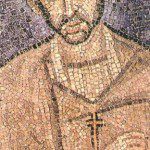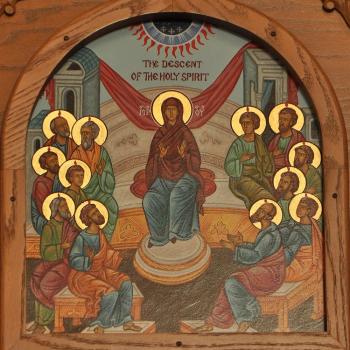![Icon of Pentecost By Anonymous [Public domain], via Wikimedia Commons Russland, 18. Jh.](https://wp-media.patheos.com/blogs/sites/637/2016/05/Icon_of_Pentecost_18th_c._Russia._Priv.coll_.-254x300.jpg)
By Anonymous [Public domain], via Wikimedia Commons
It was also the beginning of the end. The eschaton is immanent in Christ. As the Holy Spirit is the Spirit of Christ, it is the Spirit of the Eschaton. The Holy Spirit brings us the experience the kingdom God, the eschatological kingdom, as it unites with Christ. That is, through the Spirit which dwells in us, we partake of the eschaton. This is why the gift of the Holy Spirit is said to be imparted during the last days (cf. Acts 2:17). In and through the Holy Spirit, the Spirit of Christ, the Spirit of the Eschaton, the last days finds itself in the world, and it continues to be in the world through us. In Pentecost, therefore, we mysteriously experience the return of Jesus, who in heaven is also now with us, as St. Catherine of Siena transcribed in her Dialogue:
He said he would return and he did return. For the Holy Spirit did not come alone, but with power from me the Father and with the wisdom of the Son and with his own mercy. So you see, he returned, not in the flesh, but in his power, to firm up the road of his teaching. [1]
This is why the eschatological expectation of Jesus and the Apostles, contrary to many critics, was not in error. It was fulfilled. They expected the reign of God to be made manifest, and so it was. The kingdom of God had come in and with Jesus. The eschaton was with Jesus. Because the Spirit is perfectly united with the Divine Logos, the Spirit brings forth the return of the Logos, allowing the followers of Christ to experience the kingdom of God in their lives.
Those who find the Holy Spirit dwelling in them, find it directs them away from temporal things. This is a manifestation of the Spirit being the Spirit of the Eschaton. It dwells in the world, vivifies it, rendering it good and holy, making it ready for its place in the kingdom of heaven. It comes from its eternity and dwells with us in time, as St. Hildegard declared: “The fiery Holy Spirit, who is fiery life and true enkindling and equal life, exists in eternity, and through Spirit all forms, which were fashioned through the Son of God, are moved invisibly.”[2] The Holy Spirit, the Spirit of life, fills all things as the treasury of blessings so that those in time can find the Spirit’s graces bringing them into eternity.
This is why those who open themselves up to the Holy Spirit, those who find it coming to them and dwelling with them, find themselves no longer attached to the world in its temporal glory. Instead, they find themselves glorifying in the kingdom of heaven, rejoicing in the grace the eschatological Spirit imparts to the world. They will be sad for the harm they see happening to the world through sin, but their hearts will be lifted up with great joy thanks to the eschatological kingdom of God which they will see is all around them. This is why they will be able to find the hope given to them by the Spirit is able to counter any of their temporal hardships. Or, as St. Anthony of Padua preached, “To mourn is to be without light; whoever lacks the light of worldly glory, the Holy Spirit will fill with the consolation of his grace.”[3] The consolation is the consolation of the eschaton as it has been brought to us in the incarnation of the Logos and shared with us by the Holy Spirit.
Pentecost rendered upon the body of Christ, the church, the gift of the Spirit, the grace of the eschaton. It was revealed in an most extraordinary fashion: “And there appeared to them tongues as of fire, distributed and resting on each one of them. And they were all filled with the Holy Spirit and began to speak in other tongues, as the Spirit gave them utterance” (Acts 2:3-4 RSV). The Holy Spirit is experienced as the purifying fire of love, the fire of the eschaton which extinguishes sin, as St. Anthony of Padua explained: “Then grace of the Holy Spirit is called a ‘river of fire’; a river, because it extinguishes the thirst for temporal things and washes away the stains of sin; fiery, because it inflames to love and illuminates to knowledge.”[4] Furthermore, St. Anthony indicated that the Holy Spirit came in the form of tongues of fire to represent the bold new way the Apostles would go forth to proclaim the Gospel: “ So today it is said to appear upon the Apostles in tongues of fire, because it made them to speak and to burn. They burned with love of God, they enlightened their neighbour with a word.”[5]
It was not just for a select few, but for all, the Holy Spirit has been given. Using the Latin translation of the Acts of the Apostles, the Venerable Bede indicated how Pentecost revealed the universal work of the Spirit: “The word effusion shows the lavishness of the gift, for the grace of the Holy Spirit was not to be granted, as formerly, only to individual prophets and priests, but to everyone in every place, regardless of sex, state of life, or position.”[6] This is not to say everyone has the same gift of the Spirit. We are one in the body of Christ, and we find there are many gifts, as there are many parts of the body, but all of them are from the one and same Spirit, of the one and same glory, and bring us to the one and same eschatological kingdom of God. Furthermore, St. Anthony indicated that the Holy Spirit came in the form of tongues of fire to represent the bold new way the Apostles would go forth to proclaim the Gospel:The Spirit moves us to be more than individuals cut off from each other, but rather, helps us to be one. Thus, Hans Urs von Balthasar wrote: “He had to give us his Spirit. He had to break through the limits set by creation between I and Thou, between man and man, and infuse something of his own ‘I’ into our own ‘I’.” [7]
Christ told us that the Spirit will be given to us in accordance to the way we follow him in love:
If you love me, you will keep my commandments. And I will pray the Father, and he will give you another Counselor, to be with you for ever, even the Spirit of truth, whom the world cannot receive, because it neither sees him nor knows him; you know him, for he dwells with you, and will be in you. I will not leave you desolate; I will come to you. Yet a little while, and the world will see me no more, but you will see me; because I live, you will live also. In that day you will know that I am in my Father, and you in me, and I in you. He who has my commandments and keeps them, he it is who loves me; and he who loves me will be loved by my Father, and I will love him and manifest myself to him (Jn. 14:15-21 RSV).
The Holy Spirit is the Spirit of love, and we dwell in Christ through the Spirit of love. Moreover, the Spirit unites Christians together and makes them one as the Father and Son is one (cf. Jn. 17:21). It is in a unity of love (caritas, charity) that we discern the Spirit, and so, to no surprise, we find it is upon such a unity that the Holy Spirit was received at Pentecost, as St. John Chrysostom noted: “Observe, how when one is continuing in prayer, when one is in charity, then it is that the Spirit draws near.”[8] We are to follow Christ in love so we can be united with him by such love, but following him in love makes us love others, love our neighbor, and therefore unite with them with that love. This is why it is by love we will be shown to by Christ’s disciples, for it is in love we have the Spirit, and with such love, we find the Spirit comes to us, purifies us, and grants us not just a share of the eschaton, but the everlasting glory of the eschaton, a glory which never ends.
[1] St. Catherine of Siena, The Dialogue. trans. Suzanne Noffke, O.P. (New York: Paulist Press, 1980), 70.
[2] St. Hildegard of Bingen, Solutions to Thirty-Eight Questions. trans. Beverly Mayne Kienzle, Jenny C. Bledsoe and Stephen H. Behnke (Collegeville, MN: Cistercian Publications, 2014), 69-70.
[3] St. Anthony of Padua, Sermons for Sundays and Festivals. Volume IV. trans. Paul Spilsbury (Padua: Edizioni Messaggero Padova, 2010), 264.
[4] St. Anthony of Padua, Sermons for Sundays and Festivals. Volume IV, 269.
[5] St. Anthony of Padua, Sermons for Sundays and Festivals. Volume IV, 269.
[6] Venerable Bede, Commentary on the Acts of the Apostles. trans. Lawrence T. Martin (Kalamazoo, MI: Cistercian Publications, 1989), 32.
[7] Hans Urs von Balthasar, You Crown the Year With Your Goodness. trans. Graham Harrison (San Francisco: Ignatius Press, 1989), 137.
[8] St. John Chrysostom, A Commentary on the Acts of the Apostles in NPNF1(11): 26.
Stay in touch! Like A Little Bit of Nothing on Facebook:
A Little Bit of Nothing
















